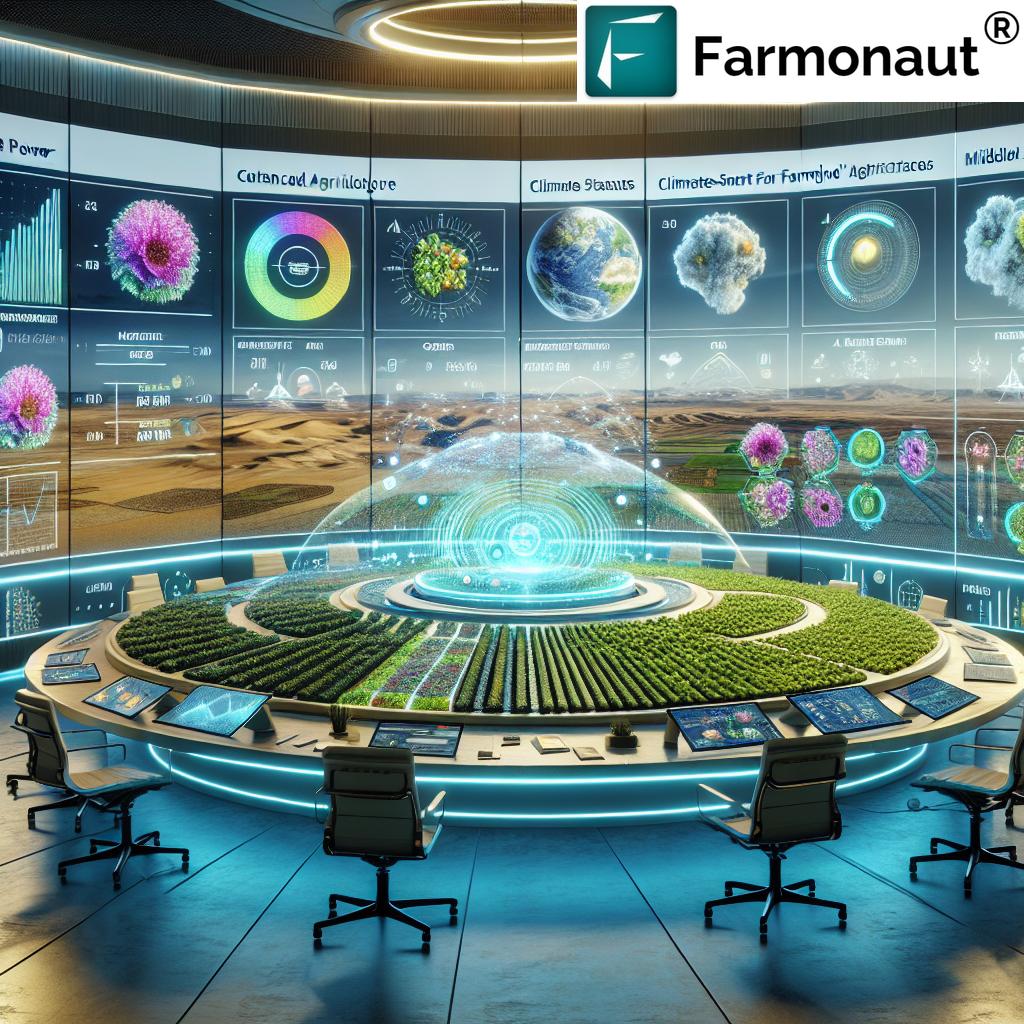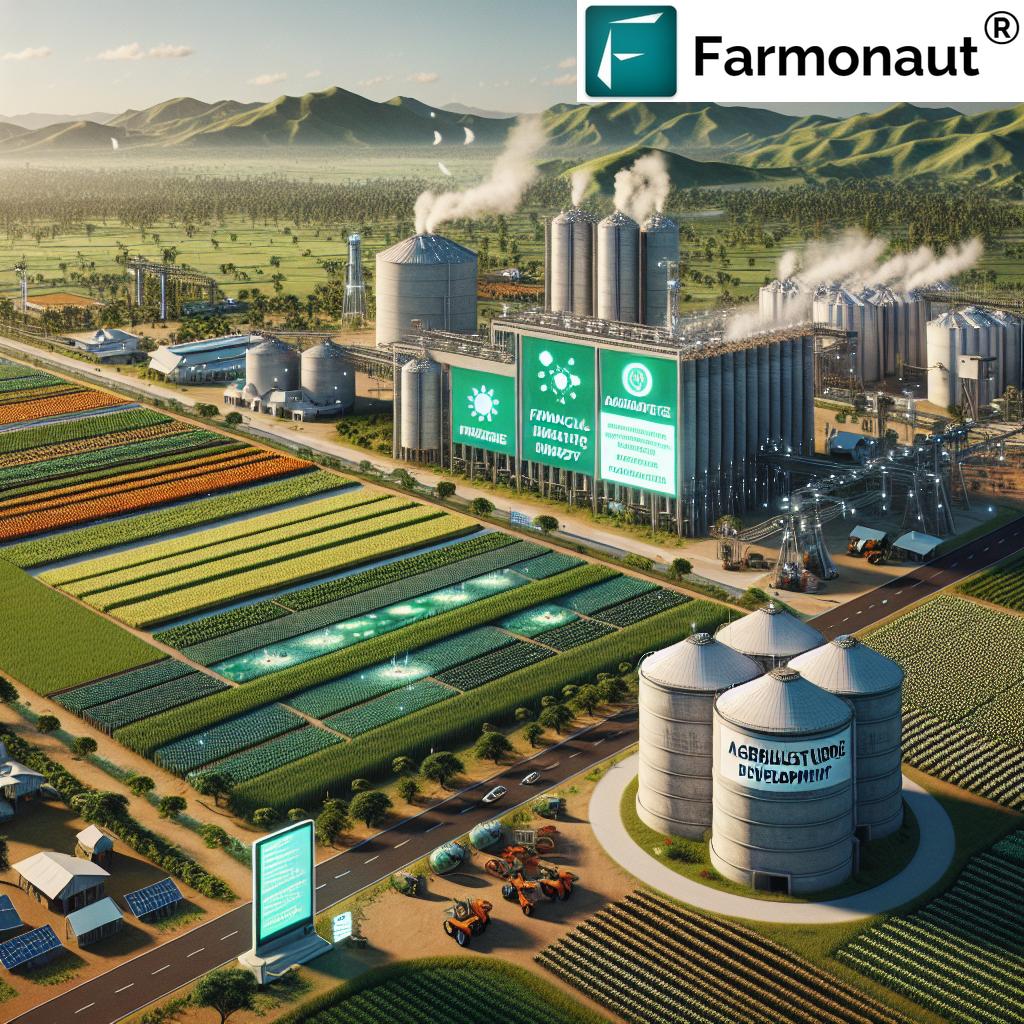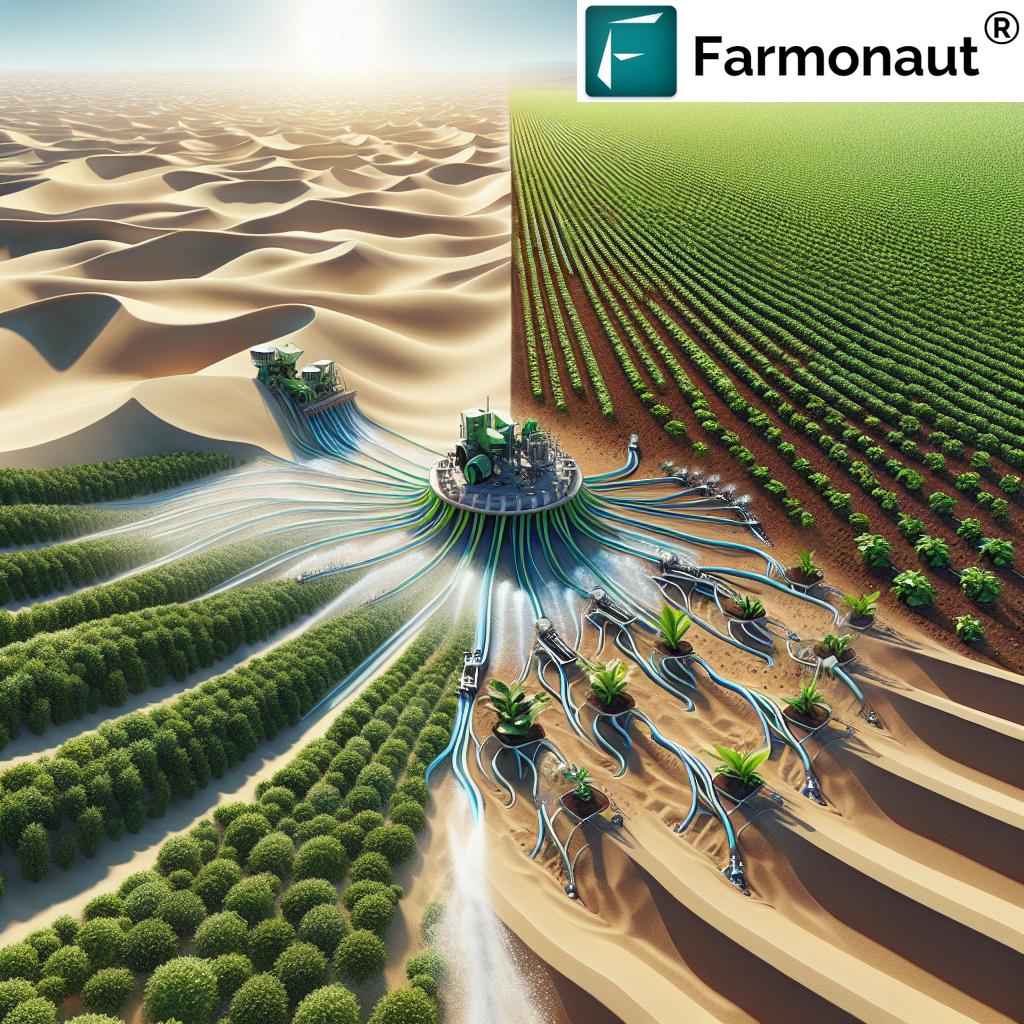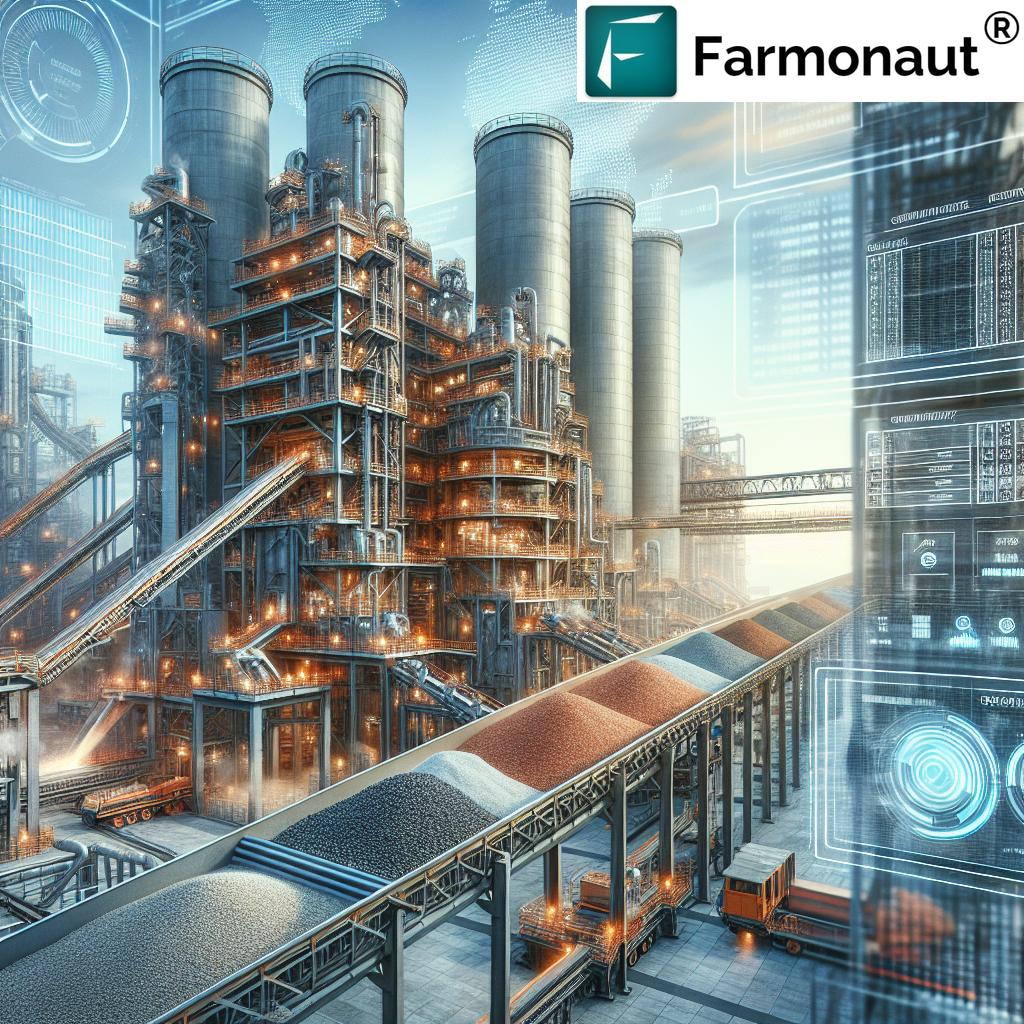Farming in South Korea: 2025 Agriculture Innovations
“By 2025, over 60% of South Korean farms are projected to adopt smart greenhouses for efficient crop management.”
Table of Contents
- Overview of Farming in South Korea
- Significant Transformation of Agriculture South Korea
- Technological Advancements Driving South Korea Farming
- Government Policies & Support for South Korea Farmland
- Key Challenges Facing Agriculture of South Korea
- Efficient Farmland Management in South Korea
- Top Agricultural Innovations in South Korea (2025) – Summary Table
- Satellite, AI, and Farmonaut Solutions in Korean Agriculture
- Future Outlook for Sustainable Agriculture South Korea
- FAQ – Farming in South Korea: 2025 Innovations
- Farmonaut Subscriptions and Access
Overview of Farming in South Korea
Farming in South Korea, also known as agriculture South Korea, has evolved into a highly advanced and efficient industry by 2025. The agricultural landscape of this East Asian nation is characterized by a limited amount of arable land – in fact, only about 17% of South Korea’s total area is classified as farmland. This significant constraint has pushed South Korean farmers to innovate, maximizing productivity on smaller plots through the adoption of high-intensity cultivation techniques and precision agricultural methods.
The main crops grown across South Korea farmland include rice, barley, vegetables, fruits, and the highly-valued ginseng. Rice remains the staple crop and holds a crucial place in Korean culture and cuisine. Despite modern advances, traditional farming values and methods are still deeply embedded within the agricultural system, creating a unique blend of the old and the new.
As demand for domestic food security rises and environmental challenges persist, agriculture of South Korea continuously adapts to maintain its efficient, sustainable, and resilient character.
Significant Transformation of Agriculture South Korea: Evolving Landscape
The past decades have seen South Korea undergo a significant transformation in its agriculture sector. From a primarily subsistence-based system, Korean agriculture has embraced advanced and technologically innovative practices to meet the modern food security needs of an urbanized, developed nation.
- Urbanization: A growing population and a shift towards urban centers pushed innovation in cropping systems and resource management.
- Population & Demographics: Labor shortages due to an aging farmer population accelerated the need for automation and smart farming solutions.
- Environmental Concerns: Issues such as soil degradation, water scarcity, and climate change led to a strong focus on sustainable agriculture methods and eco-friendly practices.
- Global Competitiveness: The drive to compete internationally resulted in heavy investments in research and technology adoption.
The result is a dynamic agricultural industry that reflects the country’s commitment to food production, sustainability, and rural development even in the face of challenging arable land constraints.
South Korea’s Agricultural Landscape: Land, Crops & Culture
South Korea’s agricultural landscape is characterized by a limited, yet highly productive, amount of farmland. With approximately 17% of the total area classified as arable land, every hectare is put to efficient use.
- Main Crops: Rice (the staple), barley, soya beans, kimchi vegetables (cabbage, radish), garlic, peppers, apples, pears, grapes, and ginseng.
- Traditional Methods: Many small plots are still family-run, reflecting generations of cultivation techniques embedded within Korean culture.
- Cultural Importance: Rice not only remains an important dietary staple but also underpins social rituals and national identity.
This blend of tradition and modernity shapes a vibrant agricultural sector capable of adapting to both domestic demand and international trends in 2025 and beyond.
Explore satellite-powered monitoring, AI-driven crop health analysis, and more for your farm or agribusiness with the Farmonaut mobile apps!
Technological Advancements Driving South Korea Farming in 2025
The government of South Korea has heavily invested in smart agriculture technologies to increase efficiency and ensure sustainability.
Today’s agriculture of South Korea is shaped by:
- Precision Farming & IoT Sensors: Internet of Things (IoT) devices, such as sensors and field stations, monitor soil health, moisture levels, temperature, and pest populations in real time.
- Drone Technology & Aerial Imaging: Drones equipped with multispectral cameras assess crops, detect problems, and guide precise application of fertilizer and water.
- Automated Machinery & Robotics: Automated tractors, planters, and harvesters boost labor efficiency and address rural workforce shortages.
- AI-Driven Analytics: Artificial intelligence analyzes field data to deliver actionable insights for maximizing productivity while minimizing costs and resource waste.
- Vertical Farming & Hydroponics: Especially prominent in the urban and peri-urban areas of Korea, these practices enable year-round high-density production of vegetables, herbs, and small fruit crops, reducing the carbon footprint associated with transport and freeing up scarce land.
These advanced innovations support every facet of farm management – from planting to harvesting – redefining what efficiency looks like in modern farming systems.
IoT and Real-Time Data: Precision at Every Plot
Precision agriculture methods driven by the Internet of Things, deployed throughout the South Korea farming sector, are transforming how crops are monitored and managed. For small but intensively cultivated farmland plots typical in Korea, real-time soil and crop modeling:
- Enables precise application of water, fertilizer, and pesticides
- Prevents waste and reduces environmental impact
- Maximizes yield and lowers production costs
For Korean farmers, this level of targeted crop management is vital to remain resilient and globally competitive, even when working with limited arable land.
“South Korea aims to increase sustainable agriculture land by 30% through advanced practices and technology by 2025.”
Smart Greenhouses & Controlled Environments
By 2025, over 60% of South Korean farms are adopting smart greenhouses integrating IoT, climate controls, and automated irrigation. These enable:
- Optimization of moisture levels and light conditions
- Protected year-round production with minimized pest and disease risk
- Significant resource efficiency gains for water, nutrients, and energy
By replicating optimal growth conditions, Korean farmers harness advanced technologies to overcome both land constraints and variable climate conditions.
Government Policy & Support: Ministry of Agriculture, Food and Rural Affairs
The Ministry of Agriculture, Food and Rural Affairs (MAFRA) continues to play a pivotal role in shaping the future of agriculture in South Korea. The government’s ongoing mission is to modernize farming infrastructure and ensure rural development while advancing sustainability and food security.
Key Government Programs Supporting South Korea Farmland
- Financial Support: Subsidies, low-interest loans, and risk-sharing policies for technology adoption.
- Training and Education: Programs help farmers learn to operate smart agriculture technologies efficiently.
- Organic and Sustainable Practices: Support for eco-friendly farming, organic certification, and international marketing of Korean organic products.
- Research and Development: Backing research institutes dedicated to resilient crop varieties and climate-adaptive farming.
- Rural Youth Initiatives: Incentives and support for young people entering agriculture to combat rural depopulation and an aging workforce.
These policies and programs are crucial in maintaining the competitiveness of Korean agriculture in the face of ongoing challenges and future uncertainty. In addition, sustainability goals have become central – for example, aiming to increase organic farmland and reduce the environmental impact of traditional farming methods.
Tip: For government agencies and corporate farms seeking scalable land monitoring and strategic planning, Farmonaut’s Large Scale Farm Management Platform offers satellite-based insights, crop health tracking, and resource optimization to support both small-scale farmers and large agribusinesses in South Korea.
Key Challenges Facing Agriculture of South Korea in 2025
Despite cutting-edge innovations, farming in South Korea still faces major challenges that shape both policy and technological development:
-
Aging Farmer Population & Rural Depopulation
Many traditional farming communities in South Korea struggle with an aging workforce, as young people migrate to urban centers. This threatens the viability of small plots and traditional practices, creating an urgent need for labor-saving automation and improved career incentives in agricultural sectors. -
Climate Change
Altered rainfall patterns, rising temperatures, and increased weather variability endanger soil health and crop yields. Innovative, climate-smart techniques and government research on resilient crop varieties help buffer these risks, but adaptation is an ongoing process. -
Land & Water Constraints
With only a limited amount of arable land, South Korea must continually optimize soil and water management while maintaining productivity. -
Food Security & Self-Sufficiency
Balancing domestic demand with import reliance is a key issue, pushing Korean agriculture towards improved yield efficiency and technological adoption. -
Transition to Sustainability
Reducing environmental impact, improving fertilizer efficiency, managing waste, and transitioning to organic and eco-friendly farming methods remains a continuous challenge.
To secure the future, policymakers and innovators are reshaping South Korea’s agricultural sector by integrating smarter technologies and promoting a transition to sustainable systems.
Efficient Farmland Management in South Korea
With only a relatively limited amount of arable land (17%), efficient farmland management in South Korea is more important than ever. Modern initiatives focus on:
- Land Consolidation: Reducing the number of small plots through cooperative farming to achieve economies of scale.
- Smart Irrigation Systems: Advanced irrigation methods leveraging sensors and data-driven controls optimize water usage and minimize waste.
- Terracing: Effective use of Korea’s hilly terrains through terracing techniques improves soil retention and productive use of slopes.
- Digital Monitoring: Continuous monitoring of crop health, soil quality, and resource allocation through satellite-driven platforms helps maximize returns on every hectare.
On the resource front, satellite-based services like Farmonaut’s Carbon Footprinting Tool help Korean producers monitor agricultural emissions and take actionable steps toward reducing the sector’s environmental impact. This not only bolsters compliance with national and international sustainability standards but supports eco-friendly certification and market access.
In addition, blockchain-powered traceability – as offered on the Farmonaut Product Traceability Platform – enables South Korean exporters to validate the authenticity, safety, and sustainability of their products, increasing consumer trust and global competitiveness.
Top Agricultural Innovations in South Korea (2025) – Comparative Summary Table
| Technology/Innovation | Description | Estimated Adoption Rate (%) | Estimated Yield Improvement (%) | Main Benefits |
|---|---|---|---|---|
| Precision Farming (IoT-capable) | Use of field sensors, data platforms, and remote monitoring for real-time management of crops and soil. | 60 | 20-25 | Reduces waste, boosts productivity, improves input efficiency, and enables quick response to crop stress. |
| Automated Machinery & Robotics | Autonomous tractors, drones, and harvesters streamline labor-intensive tasks, improving efficiency. | 45 | 15-22 | Mitigates labor shortages, increases operational speed, ensures precise input application. |
| Smart Greenhouses & Vertical Farming | Climate-controlled cultivation using hydroponics and vertical stacking for year-round, high-density production. | 62 | 25-40 | Maximizes yields, conserves water and nutrients, enables farming in non-arable urban environments. |
| AI-Driven Analytics & Advisory | Artificial Intelligence analyzing multispectral data for predictive analytics, personalized crop recommendations, and risk management. | 54 | 18-30 | Optimizes input use, predicts pest outbreaks, supports climate adaption, improves decision-making. |
| Blockchain-Based Traceability | Transparent tracking of production, processing, and logistics through blockchain technology for food security. | 30 | Not Directly Applicable | Enhances export credibility, prevents fraud, boosts consumer confidence in Korean produce. |
Satellite, AI, and Farmonaut Solutions in Korean Agriculture
As digital transformation accelerates in agriculture South Korea, advanced satellite and AI platforms offer real-time crop insights, field management, and resource optimization. This is where we at Farmonaut see a profound impact on farmers, businesses, and government agencies striving for food security, efficiency, and sustainability.
- Satellite-Based Monitoring: By analyzing satellite imagery, our system supports real-time monitoring of crop health, soil moisture, and vegetation performance on South Korea farmland, helping farmers and managers maximize yields and maintain soil health even in small or fragmented plots.
- AI-Based Advisory Systems (Jeevn AI): Our app and platform deliver 24/7, field-specific recommendations powered by AI. For Korean producers, this means receiving actionable insights on irrigation timing, fertilizer needs, and pest risk—all based on real-time environmental observations.
- Blockchain Traceability: By leveraging the traceability module, supply chain managers and exporters in Korea can offer transparent, tamper-proof records—from cultivation to store shelf—thereby boosting end-consumer trust and meeting global food safety standards.
- Resource & Fleet Management: On Fleet Management, operational leaders coordinate machinery use, optimize logistics, and improve safety/maintenance, all with satellite-based verification and tracking.
- Carbon Footprint Monitoring: Using our carbon tracking platform, Korean agricultural operations can proactively monitor and reduce their environmental impact, supporting the country’s sustainability objectives.
- Crop Loan and Insurance Support: Our satellite-based verification tools empower banks and insurers across South Korea farming communities to provide fast, risk-mitigated loans and insurance products, reducing fraud and supporting resilient rural economies.
- API Integration for Developers: For tech, business, and research users in Korea, we provide satellite and weather APIs and developer documentation for seamless integration of advanced insights into their own platforms or national systems.
Future Outlook for Sustainable Agriculture South Korea
Looking beyond 2025, agriculture in South Korea is set to advance through deeper integration of artificial intelligence, satellite imagery, and sustainability-first practices. Our shared goals in Korea will be:
- Maintaining food security amid climate and geopolitical risks
- Expanding organic and eco-friendly farms to meet domestic and export demand
- Further automating labor-intensive operations with robotics and AI image analysis
- Empowering the next generation of Korean farmers with training, land access, and digital tools
- Embedding blockchain traceability and satellite-based monitoring into everyday operations for transparency, security, and trust
- Optimizing limited arable land using vertical, urban, and peri-urban farming
With continued ambition, technological leadership, and collaborative efforts from all industry stakeholders, South Korea’s agricultural sector is well-positioned to remain highly resilient, productive, and sustainable into the future.
FAQ – Farming in South Korea: 2025 Innovations
What are the main crops grown in South Korea in 2025?
The primary crops grown include rice (the staple), barley, soya beans, major vegetables (like kimchi cabbage and radish), fruits including apples, pears, and grapes, as well as specialty crops like ginseng.
How much farmland is there in South Korea?
Only about 17% of South Korea’s total land area is arable. This limited amount of farmland drives the need for high-intensity cultivation and adoption of advanced technologies such as IoT, robotics, and vertical farming.
What are South Korea’s biggest agricultural challenges?
Key challenges include aging rural populations, labor shortages, climate change impacts, limited arable land, food security concerns, and managing the transition to sustainable and organic practices.
How is technology changing farming in South Korea?
Technology is revolutionizing the sector through precision agriculture using IoT sensors and drones, AI-based analytics, smart greenhouses, vertical farming, blockchain traceability, and satellite-based monitoring platforms, enhancing yield, efficiency, and sustainability.
How can farmers benefit from satellite and AI-based farm management?
Farmers can monitor crop health, track soil moisture, predict threats, and optimize resource usage with real-time insights available on mobile, web, and via APIs. Such platforms, including those from organizations like us at Farmonaut, provide actionable data to improve both productivity and environmental stewardship.
Are Farmonaut’s services available for individual small farmers in Korea?
Yes. Our platform is accessible to individual producers, agribusinesses, and even government agencies—through mobile apps, web dashboards, and API integrations—making advanced technology affordable and scalable for all participants in the sector.
What role does blockchain play in agricultural innovation?
Blockchain technology is essential for product traceability, supply chain transparency, and fraud prevention—building both consumer trust and regulatory compliance for Korean-grown products in global markets.
Farmonaut Subscriptions and Access
Ready to start leveraging satellite-driven insights for your farm management, carbon footprint tracking, supply chain traceability, or fleet logistics in South Korea? Access cost-effective subscription plans and resources tailored for producers, agribusinesses, and government agencies via our platform.
Access our multilingual mobile and web platforms to get started today, or review our API and Developer Docs for custom integrations.
Conclusion: South Korea’s Farming Innovations Reshape the Future
By 2025, farming in South Korea is a model of how limited arable land, modern food security demands, and changing environmental conditions can be met with relentless innovation. Combining smart technologies like IoT, drones, AI, and blockchain with advanced government policy and efficient resource management, agriculture South Korea sets a benchmark for resilient, sustainable growth in the region.
With the ongoing evolution of agricultural practices and access to scalable, affordable digital tools (like those from us at Farmonaut), farms of all sizes and types—from mountain slopes to urban rooftops—will continue to thrive, adapting to both challenges and opportunities of the future.












